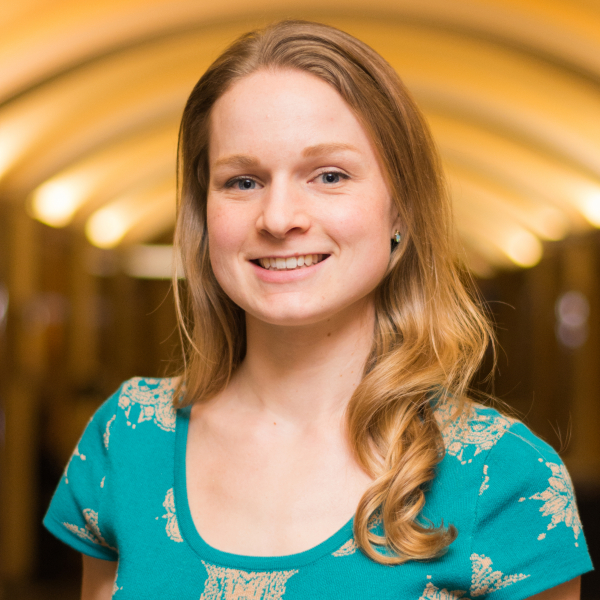Amy Fraley Wins Rackham Predoctoral Fellowship

Amy Fraley has been awarded the 2018 Rackham Predoctoral Fellowship. Amy, a fourth-year student, is pursuing her PhD in the University of Michigan Interdisciplinary Program in Medicinal Chemistry. The Rackham Predoctoral Fellowship supports exceptional doctoral candidates who are actively working on their dissertation research and writing. The Fellowship acknowledges students who have taken a risk and are working on particularly creative or ambitious dissertations. This competitive fellowship provides the winner with a stipend of $32,000, candidacy tuition, and required fees for twelve months.
Amy has an exceptional record of achievement in the areas of teaching, research, and service. “Amy’s accomplishments are highly predictive of a trajectory that will lead Amy to a successful career in academic research and teaching,” said David Sherman, PhD, Hans W. Vahlteich Professor of Medicinal Chemistry, College of Pharmacy and Amy’s thesis co-advisor. “She demonstrates the ‘leaders and best’ attributes and every sign of being on a course toward success.”
Amy is an award winning scientific communicator and innovative teacher. She recently developed a new undergraduate field/laboratory course. This concept led to her selection as a 2017-18 Department of Education Graduate Assistance in Areas of National Need (GAANN) Fellow. Her course will be implemented in the well-known Botany 457: Algae in Freshwater Ecosystems course at the U-M Biological Station during August 2019, which will be cross-listed in medicinal chemistry for the new Bachelors of Science in Pharmaceutical Sciences program in the College of Pharmacy. The botany course has been running for 30 years, and it has become evident that Michigan is endowed with highly diverse blue-green algae (cyanobacteria) in the vast pristine wetland bogs, fens, and meadows of the forested northern part of the state. Amy has developed a curriculum for a spin-out section of the course that will focus on field and laboratory work to collect, isolate, and characterize new biologically active metabolites from these prolific species.
In 2016, Amy was awarded first place in the U-M Life Sciences Institute (LSI) student poster competition. This award involved developing a poster presentation, and explaining her research in a maximum of three minutes to a panel of LSI faculty judges. In the Fall Term of 2017, Amy was invited to Pfizer (Groton, CT) to present her dissertation research. She was one of four students involved, and her project was selected from more than 50 applications.
“Amy’s ongoing work reveals her ability to continue to push the boundaries of natural products research in new directions,” explained Dr. Sherman. Her work focuses on biocatalytic halogenation of complex natural products with therapeutic potential. Halogen atoms can play a significant role in medicinal chemistry, but the challenges associated with traditional methods for halogenation preclude synthesizing them for further testing as potential therapeutics. “By utilizing the reactivity of biocatalysts, we can perform selective and environmentally benign reactions.” Her collaborative efforts with the laboratory of Janet Smith, PhD, have helped to understand the basis for an intramolecular Diels-Alder reaction to form the bicyclo[2.2.2]diazaoctane core common to a group of biologically active fungal indole alkaloids. “It is clear to me that Amy is an exceptional and highly-motivated PhD student. The level of inquisitiveness she has for natural product sciences, the larger picture of the project as a whole, and scientific reasoning behind every experiment demonstrates her unusual commitment to research and scholarship”
Amy also has an exceptional record of service to the community. She has been very active as a mentor of graduate and undergraduate students. This work includes the direct mentorship of graduate-level rotation students, and working to train students participating in the College of Pharmacy Interdisciplinary Research Experience for Undergraduates. Finally, Amy has served as co-chair of the NSF Center for C-H Functionalization Student Leadership Council, which has included designing and leading professional development programs for students and postdoctoral fellows.



